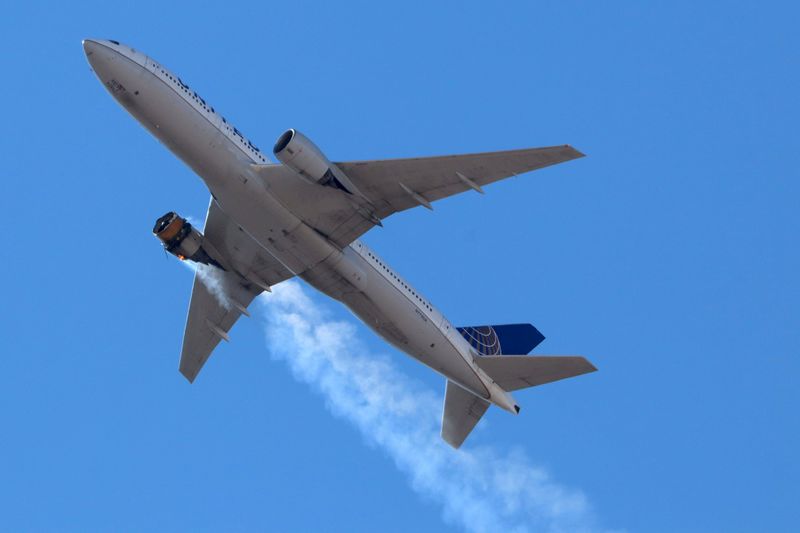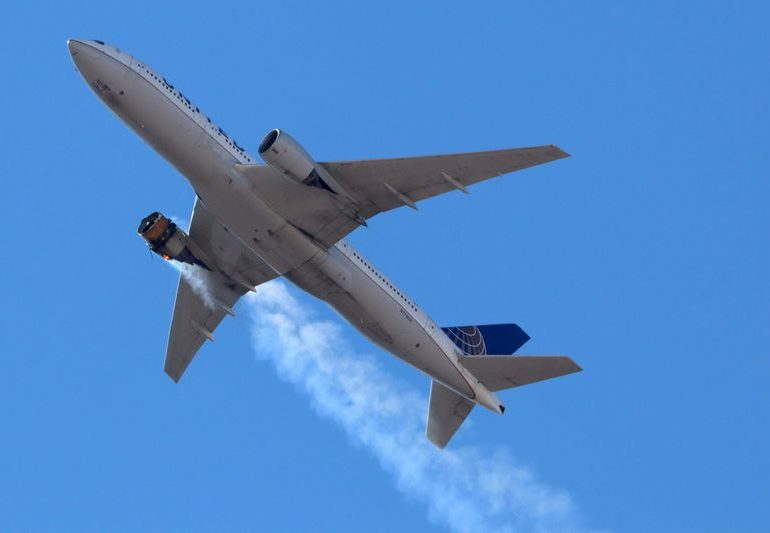2/2  © Reuters. FILE PHOTO: United Airlines flight UA328 returns to Denver International Airport with its starboard engine on fire after it called a Mayday alert 2/2
© Reuters. FILE PHOTO: United Airlines flight UA328 returns to Denver International Airport with its starboard engine on fire after it called a Mayday alert 2/2
By Eric M. Johnson
SEATTLE (Reuters) – Two years ago, after a second fatal 737 MAX crash in five months, Boeing (NYSE:BA) Co worked behind the scenes to urge aviation regulators not to ground the jet.
Its efforts went as far as the White House, with Boeing's then-Chief Executive Dennis Muilenburg calling former U.S. President Donald Trump to assure him the jet was safe.
But Saturday's engine failure on a United Airlines 777, which produced jarring footage of an engine on fire and chunks of metal littering a Denver suburb – but no injuries – triggered a very different response inside Boeing.
Within a day, Boeing issued a statement urging airlines to suspend use of 777 jets with the same Pratt & Whitney PW4000 engines – effectively grounding 128 jets as investigations played out.
The world's largest aerospace company also expressed unequivocal support of the U.S. Federal Aviation Administration's call for extra inspections and Japan's mandatory suspension of flights.
"If there is anything Boeing has learned from the MAX situation, it's to take action immediately," one industry source familiar with Boeing's thinking said. "Even if that action might result in some loss or embarrassment – do it quickly."
Boeing's response to Saturday's engine failure reflects the challenges its brand and image face as the company rebuilds its core commercial jet programs and its corporate finances.
The incident involving the United 777 happened in the United States – the epicenter for Boeing's frayed regulatory and political relationships and a market in which air accidents are exceptionally rare – and draw exceptional attention when they do occur.
Saturday's dramatic incident, and a separate incident the same day in the Netherlands during which another PW4000 engine blew apart on a 747, sparked a storm on social media, where widely shared videos showed jet engines on fire mid-air and a massive engine blade wedged into the roof of a car.
Investigators are focusing attention on the engine, which was designed and built by Raytheon Technologies (NYSE:RTX) Corp's Pratt & Whitney unit, not Boeing.
Still, as media reports of the Denver incident broke on Saturday, Boeing officials told the FAA they supported a recommendation for extra inspections, a second source said. That was hours before Boeing issued its public comment, even though an effective grounding would impact other customers flying with PW4000 engines.
“They are trying to rebuild, cooperate, take ownership,“ said Paul Argenti, a professor at Dartmouth’s Tuck School of Business. “Their reputation is the most valuable asset they have, and they need to be transparent to build trust.”
A Boeing spokesman declined to comment.
The incidents followed other mid-air engine failures involving Pratt & Whitney's PW4000, most recently in December, when a malfunction forced a Tokyo-bound JAL 777 to return abruptly to Naha airport.
A Pratt & Whitney spokesman did not immediately respond to a request for comment. The firm said it was coordinating with regulators to review inspection protocols.
The weekend's incidents involved two aging aircraft and happened in the middle of a global pandemic that has decimated demand for the largest jets Boeing produces. The potential financial impact to Boeing of grounding the older planes is relatively small, analysts said.
The MAX crisis, by contrast, involved a design issue on Boeing's best-selling jet and happened at a time of booming air travel demand.
The nearly two-year 737 MAX grounding cost Boeing some $20 billion, triggered criminal and congressional investigations, hundreds of lawsuits and ousted executives – including Muilenburg.
As CEO, Muilenburg apologized to the victim's families and implemented changes at the board and in Boeing's engineering to improve safety oversight. He has declined to comment on the company since leaving his post in late 2019.
Industry experts cautioned that it was premature to judge Boeing's response and how the MAX crisis has shifted its culture.
"The stakes are far lower," said Teal Group aerospace analyst Richard Aboulafia. "They may have learned lessons from the MAX crisis – but this isn't the situation that would show it."
Leave a comment
